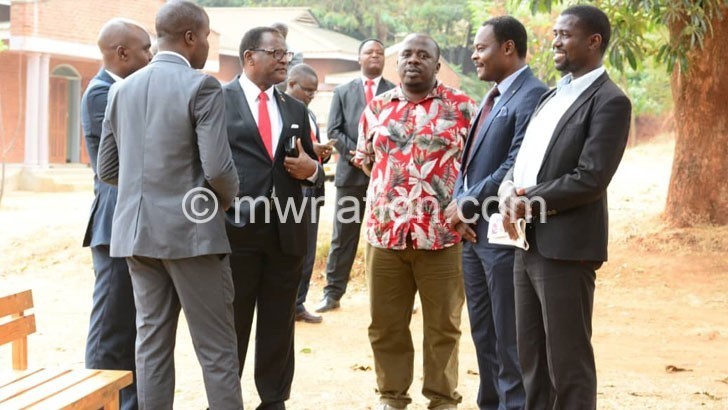‘Chakwera may face setback’
An analysis of the Constitutional Court’s preliminary ruling delivered in Lilongwe on Wednesday shows that Malawi Congress Party (MCP) presidential hopeful Lazarus Chakwera failed on eight out of 11 points under various applications made.
Chakwera, the second petitioner in the historic elections case, is asking the court to nullify the May 21 2019 presidential election and order a re-run.

A prominent legal expert, Justin Dzonzi said, in an interview yesterday, that any application that fails in an ongoing matter affects or disturbs a party’s game-plan.
“Obviously, upon rejection of any application, the party would require to re-strategise, especially where a party may want to bring new or more documents [as it would have been in this case if new evidence was accepted], it changes certain areas [of preparation].
“If the court says no, you cannot do this; the failure to produce what you wanted would automatically affect the overall evidence. It would, of course, have to take diligent lawyers to put the case back on track,” Dzonzi said.
He said there are a number of contributing factors where a party may want to bring new evidence, explaining this may include an oversight to consider that in time, having not seen some document at the time filing was being done and new developments as the case is underway.
Lawyers for Chakwera were not readily available to explain their position on the state of their case after the Wednesday ruling.
Chakwera, through one of his lawyers, asked the court to allow him to insert documents which were inadvertently omitted in the sworn statements of Peter Lackson, Daud Suleman, Anthony Bendulo and legislator Eisenhower Mkaka.
But the five-judge panel, through Justice Mike Tembo, rejected that, agreeing with lawyers representing President Peter Mutharika and Malawi Electoral Commission (MEC) that it would mean bringing new evidence.
The court also faulted the manner in which the application was brought, pointing out it was incompetent for one of the lawyers for Chakwera, Isaac Songea, to swear the sworn statement in support as the appropriate procedure would have been for the witnesses to swear supplementary sworn statements or to alter the sworn statements in compliance with the procedure provided for.
Chakwera also wanted lawyers for Mutharika and MEC not to cross-examine witnesses of the other, arguing they had common interests, but the court dismissed that, giving the respondents liberty to cross-examine witnesses of the other.
“It is, therefore, the determination of this court that while the respondents are at liberty to cross-examine each other’s witnesses, such cross-examination should be limited to those instances where they can demonstrate that the evidence of the witness they wish to cross-examine is adverse,” Tembo said.
Chakwera wanted Richard Chapweteka, Mphatso Augustin Sambo, Bendulo and Suleman to be allowed to amplify orally and, where necessary, demonstrate technical nature of their evidence, but the court rejected that. their evidence owing to the
The court noted it would have been proper to put the respondents on notice through a clause in the sworn statement itself that it would require further clarification by way of demonstration.
The requirement was only done in the sworn statement of Suleman, and the court accepted only Suleman to come.
“In the premises, the court declines to allow the application for amplification (strengthening) of evidence as this will indeed be a veiled way of introducing new evidence as argued by the respondents.
“However, we allow the application in so far as it is limited to demonstration for purposes of clarification herein, but restricted only to the sworn statement of Daud Suleman,” the court said.
The court declined to make an order to force MEC to bring particular forms as it did not find it appropriate to decide on the issue of production since the matter had been amicably resolved by the parties.
The court also rejected an application by Chakwera to rely on documents produced by Henzily Munkhondya, MEC’s director of electoral services, who is one of the the electoral body’s witnesses.
“On this matter, the court wishes to point out that these are documents that were already excluded for use by the [second] respondent (MEC) in the present matter on account of non-disclosure.
“The court holds that whilst the [second] petitioner, as an innocent party, can use documents introduced by the [second] respondent, he cannot use them as exhibits to the sworn statements of the [second] respondent’s witnesses on record such as Mr Munkhondya’s. This is because that would have the effect of enabling the respondent’s to circumvent the exclusion of evidence on its part by reason of non-compliance with the disclosure order,” Tembo observed.
The court also refused Chakwera to proceed by way of notice rather than by way of application where the court would have to accept applications or reject, other than simply notifying the court when filing documents.
The MCP presidential hopeful smiled on three areas when the court ruled that he should not be cross-examined based on the sworn statements of other witnesses, he should not be cross-examined based on his character and conduct and where the court allowed Suleman to come and testify.





